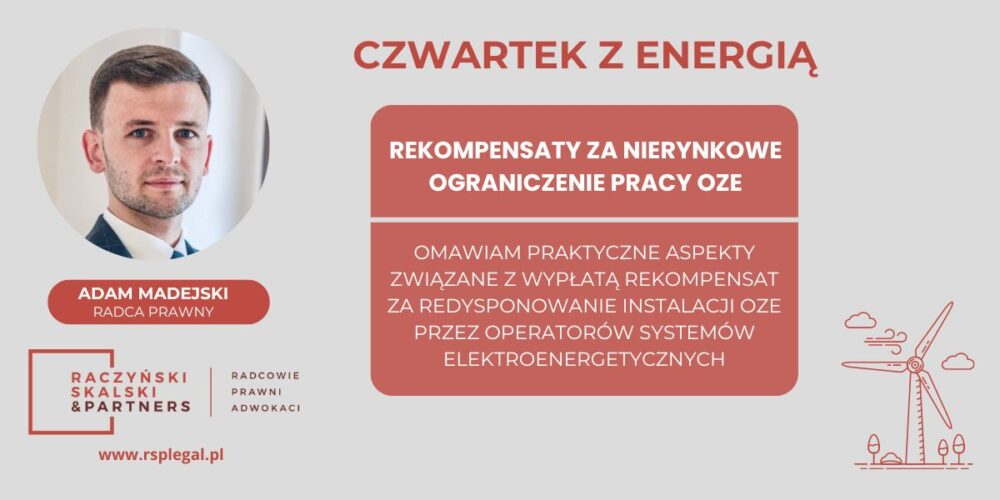Non-market curtailment of electricity production by RES installations, sometimes referred to as redispatching, has taken hold in the Polish electricity system for good. This problematic issue is becoming an important factor that not only generators, but also trading companies should take into account when managing their operations.
In today’s post, I focus on the financial compensation that is due to generators in the event of an order to limit operation or shut down a generation source by the power system operator.
1. Who is entitled to receive compensation in case of redispatch?
Unfortunately, not all generators affected by redispatch will be eligible to receive compensation – according to Article 9c Section 7g of the Energy Law, the circle of eligible entities includes only those generators that have provisions in their connection agreement regarding guarantees of reliability of electricity supply. Moreover, the market’s experience shows that an increasing number of new investments do not include such guarantees in connection agreements, which creates a need on the part of generators to take into account the risk of redispatch not only in negotiated electricity sales agreements, but also in terms of forecasts, used, for example, when applying for external financing for RES projects.
It is worth noting that the provisions of the Energy Law containing subjective restrictions on the right to compensation are in line with the provisions of Regulation 2019/943 on the internal market in electricity. In Article 13 (7) of this regulation, we find the following regulations: In the case of the application of a redispatch that is not based on market principles, such redispatch shall be subject to financial compensation paid by the system operator that issued the redispatch order to the operator of the redispatching generation unit, energy storage unit or off-take response, except for generators who have accepted a connection contract that does not guarantee reliable energy supply.
Although the regulation of the ordinance, in a way, shifts the burden of responsibility to the generator (acceptance of the connection agreement), in practice it is clear that negotiations with the distribution system operator on the supply guarantee may be at least difficult and sometimes even impossible.
With this in mind, it is worthwhile to review the provisions of the connection agreement (negotiated or already concluded) and check whether, in the event of a redispatch order, the generator can apply for compensation payments.
2. How to apply for compensation and how to calculate its amount?
The application for payment of compensation is submitted by the eligible generator to the electricity system operator to which the installation covered by the redispatch order is connected. The application must be submitted before the expiration of 180 days from the last day of the calendar month in which the order of that operator resulting in the obligation to pay financial compensation was executed (Article 9c, paragraph 7k of the Energy Law). The same operator shall make the payment to the generator, and in turn, the operator who issued the order to redispatch the generating unit in question shall return the amount of compensation to the operator paying the compensation (Article 9c, paragraph 7l of the Energy Law).
The application should include the data constituting the basis for determining the amount of compensation, while its detailed calculation is carried out by the operator to whose grid the generator is connected (Article 9c Section 7k of the Energy Law).
Detailed data on the implementation of the compensation application and explanations in the area of how to calculate the amount of compensation have been prepared by Polskie Sieci Elektroenergetyczne S.A.. These data are available on the PSE website
The mechanism for calculating the amount of compensation is based on the determination of the losses incurred by the generator due to redispatching, which are calculated as unproduced electricity and unobtained guarantees of origin or certificates of origin attributed to this energy. Depending on whether the generator uses support systems (e.g., auction), the compensation will be calculated differently than for a generator that operates fully under market conditions.
For example, the lost revenue for a generator operating fully under commercial conditions is calculated as the product of:
- the duration of the redispatch,
- the price of electricity on the balancing market during the redispatching period,
- the volume of electricity not injected into the grid due to redispatch during the redispatch period.
The volume that has not been fed into the grid can be calculated in 3 ways, depending on the metering data available to the generator and the electricity system operator. This consequently means that for three different generators with installations in the “neighborhood” the amount of compensation will be different in each case.
The rather complicated procedure for calculating the amount of compensation makes it apt that the obligation to determine the amount of compensation was imposed on the electricity system operator.
3. Contractual aspects
The growing risk of the emergence of redispatch affects contractual aspects related to the sale of electricity generated by RES installations. Parties to such a contract should consider, among other things:
- whether the generator will be entitled to receive compensation in case of redispatch?
- whether redispatch will be treated as force majeure?
- whether the electricity volume lost due to redispatch should reduce the fixed periodic volume to be billed or delivered to the customer?
- should redispatching reduce the generator’s obligations to either sell or redeem guarantees of origin?
All of the above information, as the frequency of redispatch orders increases, will be of increasing importance to the parties to electricity sales contracts. In particular, those interested in securing their legal interests should be the generators who bear the greatest risk associated with non-market curtailment of RES installations.



